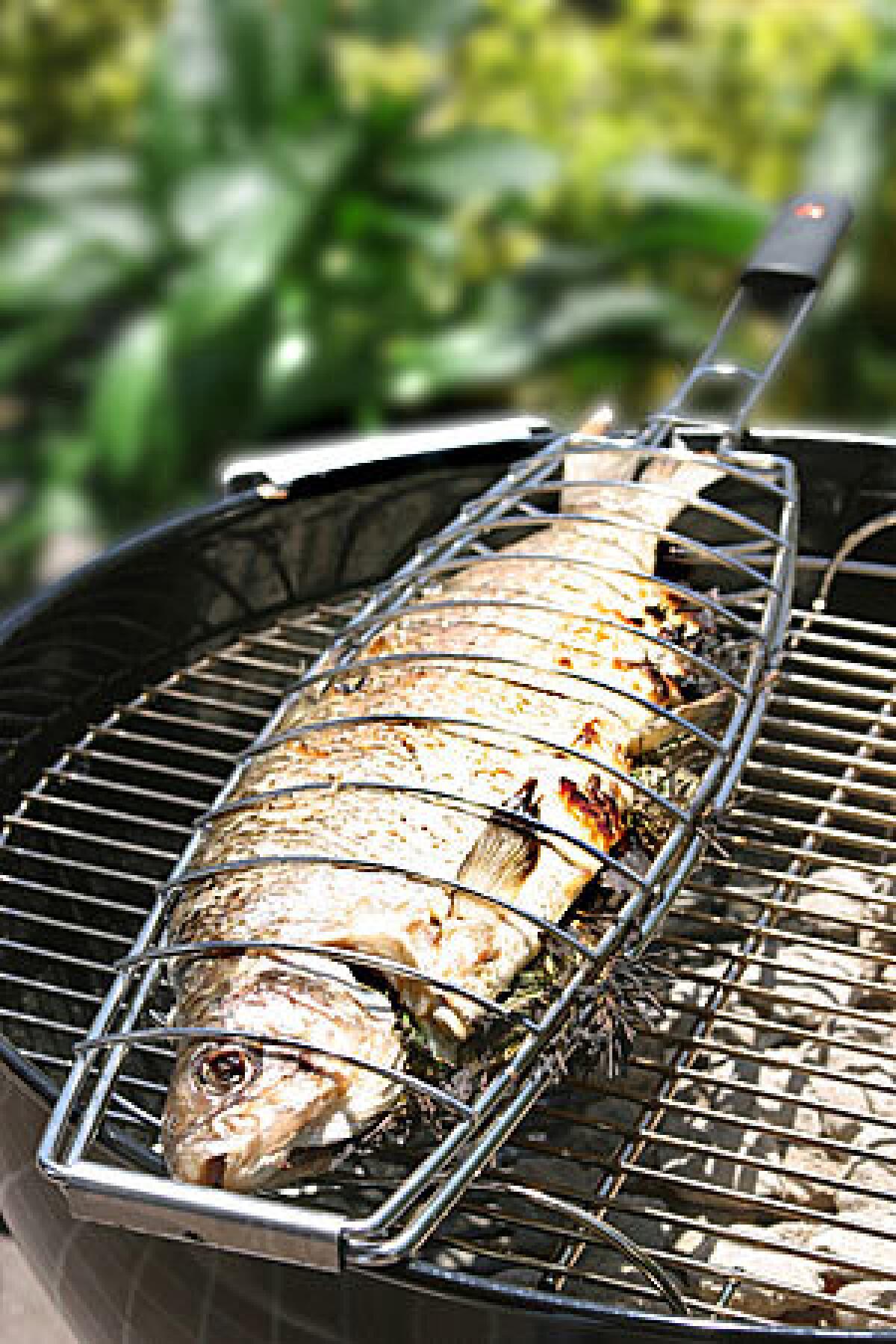Gone fishing? Get grilling

Summer twilight, the day’s bright hot colors fade into shades of gray as a cooling breeze blows in from the sea. There’s fish fresh from the grill, the skin crisp and nearly blackened, the flesh moist and sweet and gently perfumed by smoke. A drizzle of very good olive oil, a splash of lemon, a sprinkling of sea salt and you’re ready to eat.
You could be dining at a seaside villa in Taormina, a taverna in Naxos or a posada on the coast near Barcelona. Or maybe it’s just your backyard in Chatsworth.
For all of its romance, fish on the grill is something that should be in the repertoire of every good cook. Add a glass of crisp, cold white wine, a vegetable salad, or maybe even just some sliced ripe tomatoes, and you’ve got a feast fit for an exotic vacation without having to leave home.
Add just a little spin -- rolling the fish in garlicky bread crumbs, serving it on a bed of creamy white beans, or giving it a final blessing of a pungent herb sauce -- and you’ve got the centerpiece of a summer dinner party you’ll long remember.
Of course, there are some tricks to grilling fish, as anyone will attest who has had to serve the hacked-up remains of a piece of salmon that seemed to have welded itself to the grill. If you’ve been in that situation, you might well think there must be some complicated magic required, maybe standing on your head and muttering an incantation like “non stickum piscium” while you’re cooking.
The truth is both simpler and more prosaic. It’s really just a matter of following some common-sense steps. Essentially, keep your grill a clean, well-oiled place. Make it hot. And don’t mess with it too much.
Though pretty much any fish can be grilled, the higher the oil content and the meatier the texture, the easier the process will be. Especially if you’re new at this, stick with fish such as sardines, mackerel, swordfish, shark and tuna.
Probably the easiest fish to grill isn’t technically a fish -- squid cooks almost instantly and almost never sticks. Beyond those utilitarian considerations, grilled squid is delicious. Cooked over a very, very hot fire, it crisps on the outside but stays tender and only slightly chewy inside. And a touch of smoke is just the thing to point up the sweet oceanic flavor.
Even better are the already skewered squid legs you can often buy at Japanese markets. Usually labeled “ika geso,” these are a terrific convenience, and an even better bargain. For around $6 a pound, they’re already cleaned and skewered; you need only brush them with oil and sprinkle with salt and they’re ready for the grill.
Shrimp are just as easy, as long as you leave the shells on. Try skewering them on rosemary branches stripped of their needles; the flesh picks up a subtle hint of herb that nicely complements the smoke.
Ironically, probably the hardest fish to grill is the one most people try first -- salmon -- which sticks like the devil and, because of its flaky texture, breaks apart on a whim. If you must grill salmon, use steaks rather than fillets (they’re cut across the grain rather than with it). If you must use fillets, skin them first (because there’s so much moisture in the skin, it tends to stick).
There are few dishes from the grill that are as impressive -- or as delicious -- as a whole grilled fish. The skin crisps and blackens slightly, picking up a slight overtone of smoke and funk. The flesh stays moist and sweet. With good olive oil, lemon juice and sea salt -- you’ve got a masterpiece.
Whole-fish choices
THERE are two whole fish that seem to be most commonly available in Southern California markets. Both are perfect for grilling. And both, confusingly, are sold under several different names. The first is variously called Tai snapper, “true red snapper,” daurade or New Zealand snapper. The other is usually called either branzino or loup de mer. The first is caught in the wild in the South Pacific; the second is farmed in the Mediterranean.
When you buy either, have the fishmonger do the ugly part of the preparation -- scaling, cleaning the innards and trimming the fins. When you get it home, all you need to do is cut shallow gashes about every inch and a half on either side. These should go through the skin but not all the way to the bone. They will allow the heat to penetrate more evenly.
After that, all that’s necessary to cook the fish is to brush it with oil and season it with salt on both sides and in the body cavity. Give it a squirt of lemon after it comes off the grill. Of course, you can go well beyond that, marinating it with lemon and oil and herbs such as garlic, basil, rosemary and parsley (because the taste of the fish is so subtle, it picks these up pretty quickly). Stuff the cavity with the stems and trimmings of the herbs.
Another interesting treatment is lightly coating the fish in garlicky bread crumbs. Coincidentally, this is described in two recent (and excellent) books on fish cookery: “The Young Man & the Sea” by David Pasternack, chef at New York’s Esca, and “Fish Forever” by Bay Area fish maven Paul Johnson. Pasternack says he learned it in Sicily; Johnson says he learned it cooking at a country club in New Jersey. Make of that what you will.
Preparing the fish this way allows the bread crumbs to absorb some of the oil, so they get extra crisp, accentuating the texture of the skin. It also allows the fish to pick up more of the herbal flavors and it helps keep the flesh moist.
The most important thing to remember about cooking a whole fish on the grill is that it needs to cook through. Prod it with a spatula; poke it with a knife to make sure the flesh is tender to the center; if it still feels dense, let it go a little longer. And certainly let it rest for at least five minutes before serving. When the fish is done, the center bones (and the fin bones at the top) will pull away cleanly from the flesh.
To accompany the fish, choose flavors that will be bright enough to set off the smoke and herbs, but not so overpowering that they mask the meat’s delicate sweetness. In general, think about ingredients that are at least a little bit tart. A touch of crunch is always welcome too.
With the grilled snapper, for example, serve a simple salad of tomatoes and cucumbers, using a combination of red and gold cherry tomatoes to complement the colors of the cooked fish, and some of the herbs from the marinade (with the trimmings going to the stuffing). To keep the cucumbers from softening, don’t season the salad until just before serving.
Green, on the side
BLANCHED green beans dressed with olive oil and lemon juice is another great side for grilled fish. And so, for that matter, is a simple green salad. Just make sure it’s dressed on the tart side.
Also, be sure you don’t overpower the fish. In theory, a Spanish-style stew of white beans and chorizo sounded like a grand accompaniment for grilled squid, but in practice the stew made it practically impossible to taste the seafood.
Serving the white beans as a salad, and using crunchy celery instead of hearty meat made all the difference. The flavor and texture of the grilled seafood came through perfectly, and a last-minute sprinkling of pimentón de la Vera, a smoked paprika, still kept the dish’s Spanish accent.
Herb sauces are a nice complement to grilled fish, but if you’ve already used herbs in the marinade, make sure they complement those in the sauce. Make pesto (leave out the cheese, please) or aioli. Or try a salmoriglio. This is a sauce from southern Italy that adds the pungent perfume of fresh oregano to the common combination of parsley, garlic, lemon and olive oil. Try it and you’ll see that the hit of oregano serves as a welcome wake-up.
Remember to keep the flavors light and bright. After you’ve put all that energy into getting the fish just right, it would be a shame to cover it up with some heavy sauce. Save that for the winter.
More to Read
Eat your way across L.A.
Get our weekly Tasting Notes newsletter for reviews, news and more.
You may occasionally receive promotional content from the Los Angeles Times.








